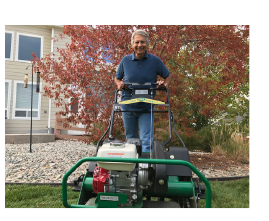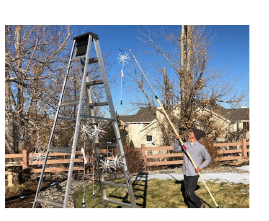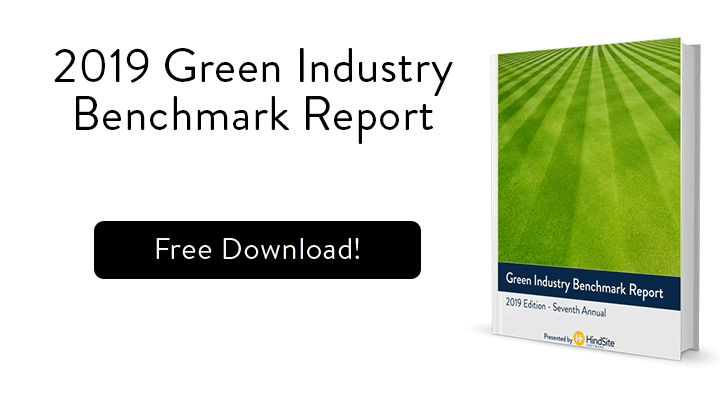This interview was conducted as part of the 2019 Green Industry Benchmark Report. To learn more about the report, visit https://info.hindsitesoftware.com/2019-green-industry-benchmark-report.
John Lane, owner of Castle Rock Sprinkler Service in Parker, CO, got his start in the green industry the way a lot of green industry business owners have - he decided he wanted to own a lawn business and did it. “I had just sold an insurance agency that I had owned and I decided I wanted to get into the lawn business, and I knew absolutely nothing. So I bought 35 accounts from a guy and his ratty old equipment and I went out and got started. I had one mower, a hedger, a trimmer, and a blower. I was mowing 350 lawns a week and fertilizing, pruning trees, mowing lawns, hanging Christmas lights, everything. Eight years later I sold the business and the property for about $1.3 million.” A non-compete kept him out of the green industry for about 8 years, but the itch never left. “I basically traveled. I did something totally different. I was buying collectibles and that sort of thing—totally different. I was on the road as much as 200 days a year. I finally got sick of it and decided I’m going to go back into business again. And so 4 years ago, in October, I decided I was going to go back into it. But this time, I was going to be limited. I was going to do sprinklers, get back, and just start an irrigation company.”
A non-compete kept him out of the green industry for about 8 years, but the itch never left. “I basically traveled. I did something totally different. I was buying collectibles and that sort of thing—totally different. I was on the road as much as 200 days a year. I finally got sick of it and decided I’m going to go back into business again. And so 4 years ago, in October, I decided I was going to go back into it. But this time, I was going to be limited. I was going to do sprinklers, get back, and just start an irrigation company.”
Lane leveraged technology that wasn’t available to him when he started his lawn care business to get his irrigation business off the ground. “I ran Adwords for Castle Rock and I did 200 blow outs in October. So that was the beginning of Castle Rock Sprinkler. We just finished our 3rd full season and it’s myself, I have one employee, a technician and I have an office person. So there’s just the 3 of us.”
"I ran Adwords for Castle Rock and I did 200 blow outs in October. So that was the beginning of Castle Rock Sprinkler. We just finished our 3rd full season and it’s myself, I have one employee, a technician and I have an office person. So there’s just the 3 of us."
In addition to helping him get his business off the ground, technology has helped him streamline it. “I changed it up, really went into technology this time around. We probably scheduled maybe 1,400 to 1,500 appointments last year and we talked to maybe 50 of those appointments, maybe 100. Scheduling is all done online by the customer. I’ve been leveraging technology to the next level. When it’s time to send out the e-mail to the customers I simply go into Mailchimp. I setup an e-mail and I send it out and literally within a minute, appointments start getting scheduled and I don’t talk to anybody. It is the most remarkable thing. If customers call me, I tell them, ‘Hey, can you do me a favor? Go to my calendar and schedule your appointment.’ Everything kind of gets driven that way. So that’s been pretty revolutionary for me just because I can do a lot more with less.”
That technology has led to tangible efficiencies. “We did $265,000 last year. I’ve been really trying to hone my system and get it really down. My office girl is not even here; she’s in Alabama. So everything is done in the cloud remotely. We go up in the morning and our schedules are on our phone automatically for her and for myself. It’s a very efficient, easy sort of an operation”
In an industry that prides itself on face-to-face communication, Lane is successful because his process is so easy from a customer’s perspective. “I didn’t really think about the implications that customers would be put off by this scheduling process. My guiding principle was to try to make it easy for people to do business with me and also get more done and with less people to get started. There’s not one week and there’s hardly a day that goes by that a customer doesn’t say, ‘John, I love your system of setting appointments. It’s so easy.’ I mean I get so many compliments and comments about that. That’s why I feel like I really stumbled on to something.”
“Today I have 1,600 Internet-savvy customers because if you can’t find me on the Internet, you can’t negotiate, make an appointment and so on, you probably aren’t my customer. I don’t have to do a lot of hand-holding with these people. They are savvy and it just works great.”
Because of demand in his area, the next phase is to start growing the business by adding staff. “Business opportunities are tremendous here where I live in Douglas County. It’s got to be ground zero for service industries because we have some of the highest per capita income in the country and houses are just packed tightly. All the homeowners associations require people to keep a lawn and keep it nice and you can’t have that unless you have sprinkler system. We get the freezing and thawing cycle here and so the work is just endless. So it’s a good place for me to be.”
"Today I have 1,600 Internet-savvy customers because if you can’t find me on the Internet, you can’t negotiate, make an appointment and so on, you probably aren’t my customer. I don’t have to do a lot of hand-holding with these people. They are savvy and it just works great."
“Now I’m sort of at the crossroads. I feel like I pretty well got the thing wired up. I’ve got way, way, way more work than I can handle. I get so many calls. Usually we’re booked up 4 to 6 weeks in advance the whole season. I’m probably going to start adding technicians as I can find them and start expanding the business. I’m not going to just grow overnight. I don’t need to grow overnight. I’m taking my time and building it slowly.”
Like all green industry contractors, the season is a busy one. “Typically we start at 8 o’clock, and we go to 5 or 6. We work Saturdays up until the end of June. July through September 22nd we don’t work Saturdays and then 22nd September we start blow outs. We run usually to the end of October and then the 1st of November will start doing inventory. All of us are out here working inventory. We’ll have 2 months off. We’ll have January and February off and then we’ll get started back in March if the weather cooperates.” A veteran of two green industry businesses spanning a couple decades, Lane thinks the work hasn’t changed much, but marketing has. “You can build a business so much quicker now. I had the previous business for 8 years and I think over that period of time, I had maybe 700 customers. It was the yellow pages and grind it out. And now in 3 ½ years, I’ve got 1,500 or 1,600. You can build a business much quicker. You can have an equal footing with people that have been around for a long time. And so I think it’s all in the business side. That’s where the changes are. The Internet has changed everything.”
A veteran of two green industry businesses spanning a couple decades, Lane thinks the work hasn’t changed much, but marketing has. “You can build a business so much quicker now. I had the previous business for 8 years and I think over that period of time, I had maybe 700 customers. It was the yellow pages and grind it out. And now in 3 ½ years, I’ve got 1,500 or 1,600. You can build a business much quicker. You can have an equal footing with people that have been around for a long time. And so I think it’s all in the business side. That’s where the changes are. The Internet has changed everything.”
In addition to helping build a business faster, the Internet can also ruin one. “Reputation is now so important. I saw the opposite of it one day. I was looking at Nextdoor and somebody asked for someone doing mowing. Somebody suggested a company and a woman said, ‘Well, let me tell you about Jim.’ She went about barbecuing that guy. Then another person said ‘Well, I used Jim and I thought it wasn’t bad.’ Then she came back and barbecued him again. That guy got so roasted that day and I’m sure it probably impacted his business. The other thing is the reviews on Google, those places. If you have got good reviews, if you’ve got multiple stars, if you’re up there, people are calling you. You already have credibility. Those things have changed everything as far as getting customers.”
As for the future of the green industry, Lane sees a dwindling labor pool impact businesses. “I think that the trend is going to be more toward boutique kind of services. When I say that, I’m talking about you’re not going to have as many big companies that are going to have many employees. I can see that it’s getting more and more difficult to find people that want to do this kind of work. Young people today don’t see this as the type of thing that they want to go into. The problem is just finding people. It’s nearly impossible and that’s only getting worse. I think it’s going to be 1 or 2 or 3 employee type operations and I think those guys are going to be very, very good at what they do. I think they’re going to be able to charge a lot of money for the services. I see kind of a shrinking down, a lot less availability of these services and they’re going to be more costly.”
"For me, what I love most about what I do is building the business. That’s what I love. And so I love just working at it, making improvements, seeing it just develop. I love providing jobs for people. I love being a reliable customer for vendors and my parts people. I like being reliable for my customers. So I like building a good business."
Lane doesn’t plan to let his age slow him down. “I just turned 66. When I started this, I said I’m going to work this thing until I’m 75. So I had a 10-year plan. And then I’m reading about this guy, he’s a barber. He’s working upstate New York. He goes to work and works full time on his feet cutting hair. He has a house. He drives himself to work. The man is 107 and I’m thinking to myself, ‘You know what, John? I think you’ve got to put 10 more years on your plan.’ And so I just told everybody, I told my wife, ‘This is a change. I’m working until I’m 85 now’. So I have a 20-year plan basically.”
For Lane, there are a lot of reasons he enjoys the work he does. “For me, what I love most about what I do is building the business. That’s what I love. And so I love just working at it, making improvements, seeing it just develop. I love providing jobs for people. I love being a reliable customer for vendors and my parts people. I like being reliable for my customers. So I like building a good business. As far as me, I love all the things I’ve done and I’ve done a lot of things. I’ve built a lot of businesses of different kinds, but of all the things I’ve done, I love this industry the most. That’s the thing I’m most passionate about. I love being outside. I love grass. I like working with my hands. I enjoy that very much. I like fixing things and I’m skilled at that.”








